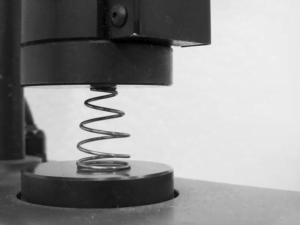In our almost 40 years of manufacturing high-quality custom springs at Gifford Spring Company, we have seen many factors that can lead to spring failure.
Our experience has given us valuable insight into the key reasons your springs could fail as designed, and more importantly—how to prevent a spring from failing.
Reason #1: Issues with the Initial Design
Certain design issues can lead to a spring becoming overstressed and ultimately failing. Factors such as spring length and size, number of coils and the amount of space between them, coil diameter, and the size of the envelope (the space in which the spring is contained) all affect the amount of stress placed on a custom spring.
Excessive spring stress can result in permanent spring deflection, meaning the spring cannot return to its original shape. Even springs that are generally well adapted to handling stress, such as compression springs, may be at risk of this outcome.
Design considerations for specific spring types
Your spring manufacturer should be able to easily identify design problems that are common to particular spring types. Examples of these problems include:
- Specifying improper end type or hook position callouts for an extension spring design, which will lead to the spring becoming overstressed
- Specifying the wrong coiling direction for a torsion spring design, which will prevent the spring’s legs from sitting properly in the assembly
- Specifying a tight index for a compression spring but failing to call out ground ends to facilitate a close fit
It is important to work with a manufacturing partner like Gifford Spring Company that understands the importance of first article testing. Creating a spring prototype for testing can help you guard against unfavorable outcomes in production.
Reason #2: Using the Wrong Material
The importance of selecting the right material for your spring’s application cannot be overstated. When choosing a material, you must account for your spring’s environment, as well as the amount of stress and repetition it will need to withstand. For this reason, we always make sure we understand a custom spring’s end use when working on a new project.
If your spring will be used in a humid environment, for example, corrosion resistance is an important consideration. A material such as unplated music wire is likely to rust and result in spring failure. Plated music wire or stainless steel will perform much better.
If your custom spring must withstand extremely high temperatures, we might recommend a material like Inconel X750 that performs well in temperatures over 1,000 degrees Fahrenheit.
No matter what properties your application demands, an expert custom spring manufacturer can help you select the ideal material.
Reason #3: Manufacturing Problems
Damage that occurs during spring manufacturing or during secondary processes, such as plating, can severely impact the integrity of a custom spring.
Partnering with an ISO certified supplier like Gifford Spring Company provides the assurance that your manufacturer will observe the most rigorous quality control practices to protect your springs from damage throughout the manufacturing process.
Customers often bring us failed springs manufactured by other shops and ask us to create spring replacements. In each case, we take the time to review the history of the spring, determine why it failed, and create a new spring prototype for our customer to test. In keeping with the high-quality standards we have in place in our shop, we always aim to resolve any possible issues before moving a spring into production.
At Gifford Spring Company, we are committed to helping customers prevent their custom springs from failing. Request a quote to work with us.